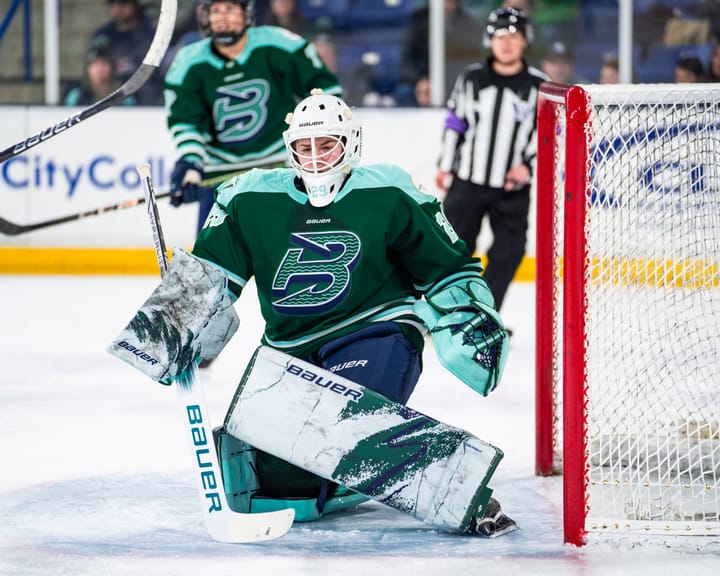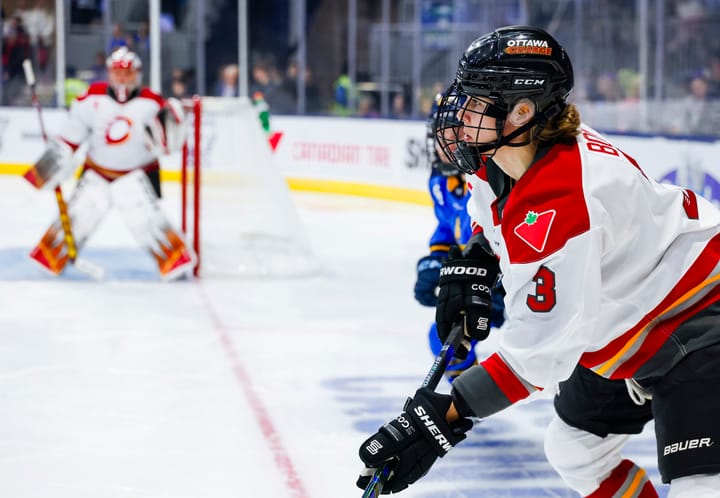Book Excerpt: The Role I Played by Sami Jo Small
Sami Jo Small is a three-time Olympian whose career as a goaltender with Team Canada spans over a decade. Her memoir on her time in the National Team program chronicles her personal ups and downs of competing at that level while giving readers a behind the scene look at what its like to be on Team Canada.
Related
‘The Role I Played’ chronicles Sami Jo Small’s career with Team Canada
Excerpted from “The Role I Played: Canada’s Greatest Olympic Hockey Team” by Sami Jo Small. © by Sami Jo Small. Published by ECW Press Ltd. www.ecwpress.com
The Olympics behind us, we’re into a new season. It’s been 10 months since Nagano and we are off to our first international tournament of the year, the 3 Nations Cup. The National Team has seven rookies, seven players that didn’t directly experience the heartbreak of Nagano and 13 players with holes in their heart. The mix creates the duality of wanting revenge juxtaposed with excitement and naïveté.
Our team takes over the back of the plane and are seated by posi- tion. Because I’m the first goalie on the roster, rookie goaltender Kim St-Pierre, from Châteauguay, Quebec, is on one side of me and our new assistant coach, Ken Dufton, is on the other. Manon is out the mix because she’s pregnant.
“How are your classes at McGill?” I ask Kim in French, as I pull out a book from my backpack.
“Yes, fine, thank you,” she says back in English, with a shy grin.
I turn to my right to see Ken’s grip on the armrests unchanged since takeoff.
“Ummm . . . you okay?”
“I just want this to be over,” he says, beads of sweat forming on his brow.
Ken, how are the Aeros doing?” I am referring to the team he coaches in the newly minted National Women’s Hockey League and trying to take his mind off flying.
He nervously plays with his eyebrow as he tries to calm himself. Never one to mince words, he says, “Great, we’re fifteen-and-oh. Best team in the league.”
I open my physics textbook and start to dig in. The flight is long, but I’m excited that I’ll get to play some games. With numerous rookies, including staff, I almost feel like a veteran. Almost.
We land in Helsinki and make our way by bus across the interior of Finland to the small town of Kuortane and a complex built specifically to train elite athletes.
The inside of the rink looks like a sauna, but the temperature feels like the tundra. Gorgeous wood planks surround us, but the tempera- ture is well below zero Celsius. We settle into training, learning Team Canada systems while attempting to bond quickly. With only a few hours of dusk/daylight every day and new foods to contend with, it’s tough on a lot of the team. But equipped with my Finnish/English travel dictionary, I relish the travel experience.
As there are only three teams in this tournament, Kim and I will play one game each against both the Finns and the Americans.
In the middle of playing my first game of the tournament against the Americans, I’m almost too green to be nervous. There’s only 30 or so people in the crowd so this doesn’t feel like an international game, but the pace of the play is quick. I settle in quickly, playing with poise. Unfortunately, one of our rookies, Toronto Aeros player Sommer West, went down early in the first period with a shoulder separation, and that put a damper on the mood between periods.
We haven’t recovered. The Americans, with a mix of veterans and rookies of their own, are outplaying us; however, I am seeing the puck well and controlling my rebounds.
It’s still 0–0 heading into the third period. During centralization last year, I played in two international games, both shutouts and both against Sweden. How great would it be to continue my career with a win against the Americans? Just as the thought passes through my conscious- ness, Goyette continues her dominance from Nagano and scores a goal to give us the lead.
The play is fast, but I’m in the zone, following the play and ensuring I cover the puck every chance I get. It’s intense, and yes, I have new teammates, but it feels no different than any other important game and I often forget that I’m playing the Olympic champions.
With only four minutes left to play in the game, we are still in the lead. Hang on, Sami. Focus. We can win this. As American forward Katie King, one of their strongest players, barrels down the wing, I ready myself, knowing she has a great shot. Katie’s been beating our defence wide all game. As she looks up, I know I have this. She shoots. My knees hit the ice, right on cue as the puck ricochets off my black leather pad. Unfortunately, King is the first to react, and she gathers up her own rebound that has careened too far out of my reach. With one sweep she capitalizes.
Suddenly, it’s a 1–1 game with just under four minutes left.
I can feel my face get red; I’m embarrassed I let in a goal. I turn and grab the puck out of my net for the referee. I replay the goal in my head. Next time I need to hold my ground. No more goals. I refocus for the faceoff knowing my team is going to need me to perform in these last few minutes.
The Americans are pressing. I’m not sure if there’s overtime or it ends in a tie, but I just need to get our team out of this period. Blocker save, kick save, I’m doing my utmost.
With under a minute to play, we finally get the puck in the American zone. A point shot leads to a scramble, and rookie Mai-Lan Lê from Montreal pounces on a puck shot from Lori Dupuis, beating their goalie Sara DeCosta.
I breathe a sigh of relief. The team pours off the bench to celebrate with me in my crease.
We win 2–1. We’ve beaten the Olympic champions.
I love to compete; I love being in the game. For the girls that lost in Nagano, I know that beating the Americans is a big deal, a small form of vengeance, but for me, it’s simply motivational fuel to want to play more.





Comments ()